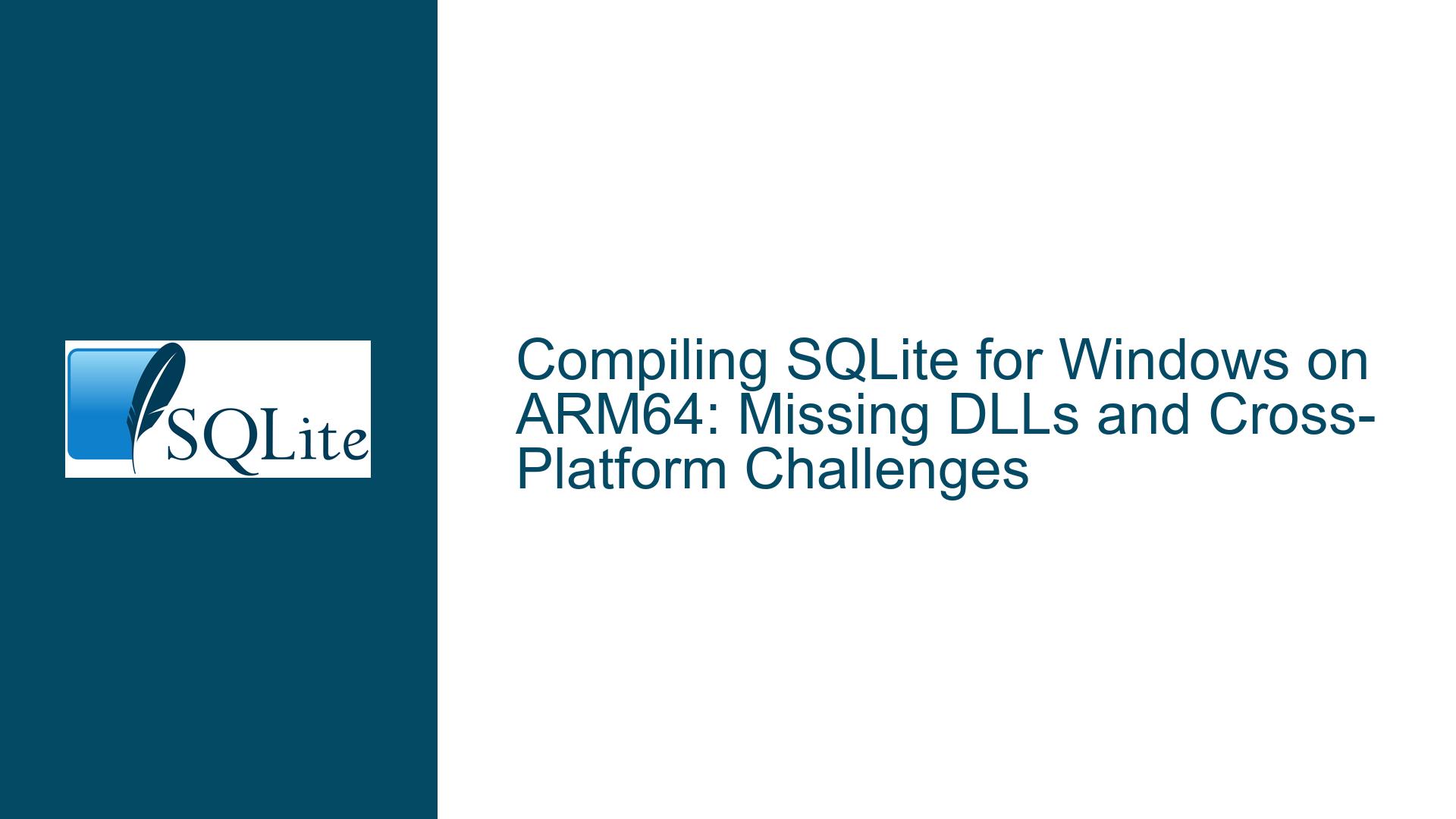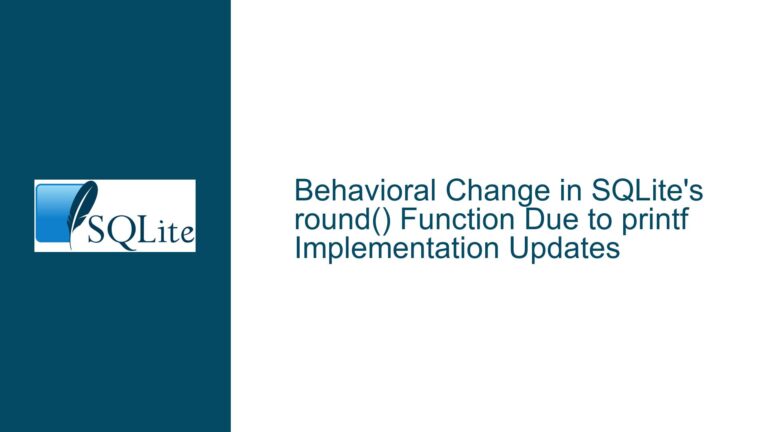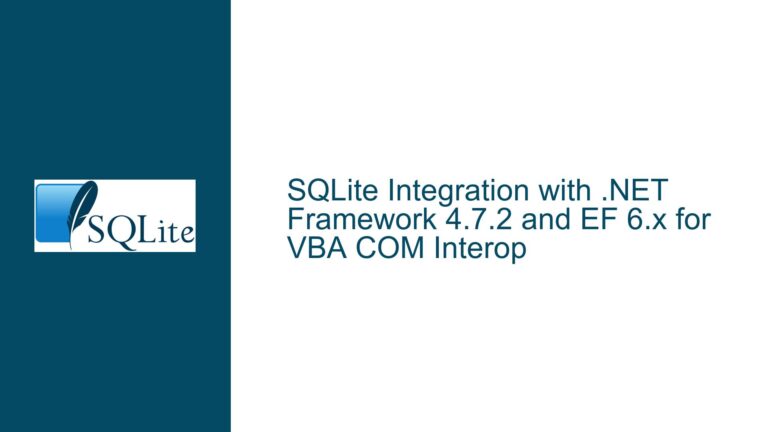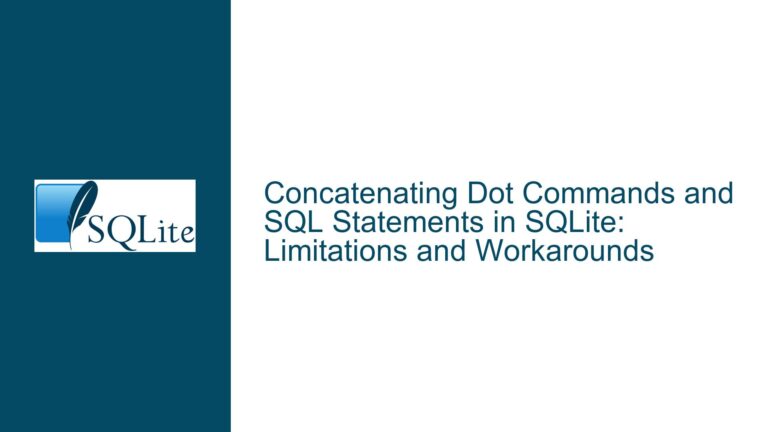Compiling SQLite for Windows on ARM64: Missing DLLs and Cross-Platform Challenges
Understanding the SQLite.Interop.dll Dependency Chain for Windows ARM64 Environments
The core issue revolves around deploying SQLite in Windows virtual machines (VMs) running on Apple Silicon (M1/M2) hardware, specifically when targeting ARM64 architectures. Users encounter missing dependencies such as SQLite.Interop.dll or failures to load the SQLite ODBC connector due to platform mismatches. This problem is exacerbated by the lack of precompiled ARM64 binaries in official distribution channels like NuGet packages or the SQLite website. The challenge is rooted in the intersection of three layers:
- SQLite’s C-based amalgamation code, which is platform-agnostic but requires compilation for specific architectures.
- System.Data.SQLite, the .NET wrapper library that depends on SQLite.Interop.dll to bridge managed and unmanaged code.
- Cross-platform toolchains, such as Docker or Visual Studio, which must be configured to target ARM64 when compiling for Windows VMs on non-x86 hardware.
The discussion highlights attempts to compile SQLite for ARM64 Windows using tools like DockCross, Visual Studio 2022, and community-driven projects. However, inconsistencies in toolchain configurations (e.g., target frameworks, platform toolsets) and missing support for ARM64 in legacy NuGet packages create roadblocks. For example, the System.Data.SQLite.Core.2017.csproj project file defaults to x86/x64 builds, requiring manual adjustments to enable ARM64 output. Furthermore, dependencies like SEE encryption introduce additional complexity when rebuilding SQLite from source, as third-party extensions may not be ARM64-ready.
Root Causes of Missing SQLite.Interop.dll and ARM64 Compilation Failures
1. Lack of Official ARM64 Builds in NuGet Packages
The System.Data.SQLite NuGet package (maintained by the SQLite team) does not include precompiled SQLite.Interop.dll binaries for ARM64. This omission forces developers to manually compile the interoperability layer, a process that requires precise alignment of:
- Target framework (.NET Framework 4.8.1 or later for ARM64 support).
- Platform toolset (Visual Studio 2022’s v143 or later).
- Runtime identifiers (win-arm64 vs. win-x64).
2. Toolchain Misconfigurations in Visual Studio Projects
Projects relying on older Visual Studio platform toolsets (e.g., v141) or .NET Framework versions below 4.8.1 will fail to generate ARM64-compatible binaries. For example, the System.Data.SQLite.Linq solution defaults to x86/x64 architectures and requires manual addition of ARM64 build configurations. Misaligned project settings—such as mixing C++ runtime libraries (MT vs. MD) or incorrect subsystem configurations (Console vs. Windows)—can further destabilize the compilation process.
3. SEE Encryption Compatibility Issues
SQLite’s SEE (SQLite Encryption Extension) module introduces platform-specific dependencies, particularly for cryptographic operations. When compiling SQLite.Interop.dll from source, SEE may link against x64-optimized libraries or require ARM64-compatible implementations of low-level functions (e.g., AES-NI instructions). Developers not using SEE can bypass these issues, but those requiring encryption face additional hurdles in porting SEE to ARM64.
4. Cross-Compilation Tool Limitations
Tools like DockCross simplify cross-compilation for ARM64 but may lack Windows-specific runtime libraries or fail to replicate the exact environment of a Windows VM. For instance, compiling SQLite.Interop.dll in a Linux-based Docker container targeting Windows ARM64 can result in ABI (Application Binary Interface) mismatches or missing Win32 API bindings.
Resolving SQLite.Interop.dll Errors and Building ARM64-Compatible Binaries
Step 1: Update Visual Studio and Dependencies
- Install Visual Studio 2022 with the ARM64/ARM64EC workload and .NET Framework 4.8.1 targeting pack.
- Ensure the C++ ATL (Active Template Library) for ARM64 and Windows Universal CRT SDK components are enabled in the Visual Studio installer.
Step 2: Modify System.Data.SQLite Project Files
- Open System.Data.SQLite.Core.2017.csproj and update the
<TargetFrameworkVersion>to v4.8.1. - Add ARM64 build configurations by editing the solution’s platform settings:
<PropertyGroup Condition="'$(Platform)' == 'ARM64'"> <PlatformToolset>v143</PlatformToolset> <WindowsSDKDesktopARM64Support>true</WindowsSDKDesktopARM64Support> </PropertyGroup> - Rebuild the solution using the Release-ARM64 configuration.
Step 3: Handle SEE Encryption Dependencies
- If SEE is required, obtain ARM64-compatible cryptographic libraries (e.g., OpenSSL built for Windows ARM64) and update the SEE makefile to reference them:
CC=clang-cl --target=arm64-windows CFLAGS=-Ipath/to/openssl/include LDFLAGS=-LIBPATH:path/to/openssl/lib/arm64 - Rebuild SEE and link it statically into SQLite.Interop.dll.
Step 4: Cross-Compile Using DockCross or Docker
- Use the dockcross/windows-arm64 image to compile SQLite in a containerized environment:
docker run --rm dockcross/windows-arm64 > ./dockcross chmod +x ./dockcross ./dockcross cmake -DCMAKE_SYSTEM_NAME=Windows -DCMAKE_SYSTEM_PROCESSOR=ARM64 .. ./dockcross make - Copy the generated SQLite.Interop.dll to the target VM and register it using regsvr32.
Step 5: Community Solutions and Workarounds
- Use tkf144/System.Data.SQLite-ARM64, a community-driven GitHub repository providing Dockerfiles and preconfigured projects for ARM64 builds.
- For .NET Core applications, switch to Microsoft.Data.Sqlite, which includes native ARM64 support and avoids the SQLite.Interop.dll dependency.
Step 6: Contribute to Official Distribution Channels
- Submit pull requests to the System.Data.SQLite repository with ARM64 build configurations.
- Advocate for ARM64 binaries in NuGet packages by opening GitHub issues or engaging with maintainers.
By addressing toolchain gaps, updating project configurations, and leveraging community resources, developers can successfully deploy SQLite on Windows ARM64 VMs—even in the absence of official precompiled binaries.






